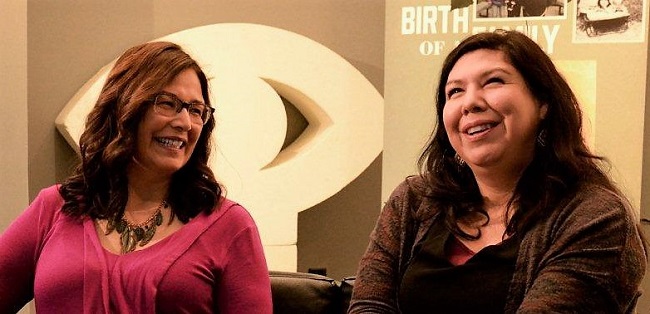Sixties Scoop survivors building family bonds

By Barb Nahwegahbow
TORONTO—“People don’t realize how profound it is to not be raised with your language and your culture and your community and your family,” said filmmaker Tasha Hubbard.
Hubbard’s film, Birth of a Family about four siblings taken from their mom during the infamous Sixties Scoop, had its world premiere at the recent Hot Docs International Documentary Festival in Toronto. The film played to packed houses and was rated in the top 10 audience favourites.
Hubbard collaborated with Betty Ann Adam, the oldest of four siblings who were all raised in white homes. Adam was taken from her mom when she was three and her three younger siblings were taken when they were babies. Two were adopted, while Adam and another sister were raised in foster homes. Adam is a journalist with the Star-Phoenix in Saskatchewan and it was her dogged persistence that brought the family together.
The film documents the first time the siblings gather to build family and create memories. Adam decided to use the Residential School Common Experience payment, “to bring my family together and repair some of the damage that happened, to make use of it for what it was intended. I thought that was the only way to honour our mother.”
The film introduces the audience to the siblings in the airport where Adam awaits their arrival, pacing nervously. We are introduced to Ben who is the baby of the family, Rose, and Esther, the last to arrive flying in from California. Once they arrive at their cabin in Banff, Betty Ann distributes hoodies with “MJs Kids” on them. She also has an artist’s portrait of their mom which is placed prominently on the fireplace mantle. Later, group photos of the four siblings join their mom on the mantle.
Audiences responded strongly to the many poignant moments in the film. The siblings sit around the kitchen table sharing photo albums and the special occasions in their lives. They buy party hats and bake a cake to celebrate the 212 birthdays that they missed by being separated.
The film’s director Tasha Hubbard, who is also a Sixties Scoop survivor, said when she hears cousins talking about experiences and adventures they shared as kids, she feels sad and she misses being part of that.
“It’s a challenge to make bonds as an adult. It really is,” expressed Hubbard.
“I was so heartened,” Adam noted. “By the way my siblings came together, that we all wanted this.”
All of the siblings have all agreed to be open and honest about their feelings.
“…That’s the only way we’re really going to get to know each other,” stated Adam. “There’s tears and anger and forgiveness and there’s love and it’s all good.”
They’ve had two more gatherings since the film.
Both Adam and Hubbard want people to understand that the film is just a chapter in the state’s assault against Indigenous families. Recovery for those affected takes years. It’s a long struggle with effects that reverberate for generations, they said.
“It’s not the solution for our kids to go into non-Indigenous homes,” said Hubbard. “We really need to stop villainizing our people for having the effects of being under assault for so long…we had healthy families, we had ways of relating to each other, to strengthen and continually renew those bonds of family. That’s all been dismantled. We need to look at the bigger picture of family support.”
Adam acknowledges Marie Wilson, former Commissioner with the Truth and Reconciliation Commission for encouraging her to documenting their gathering.
“She’s one of my heroes,” said Adam. “She really heard me when I told her my story. She is the Grandmother of this film and I have the greatest love and respect for her.”
Birth of Family is a National Film Board production.


